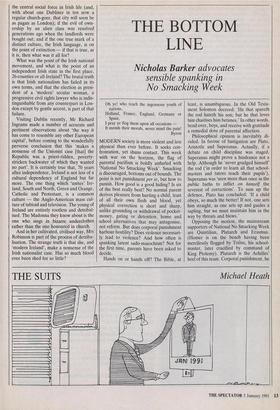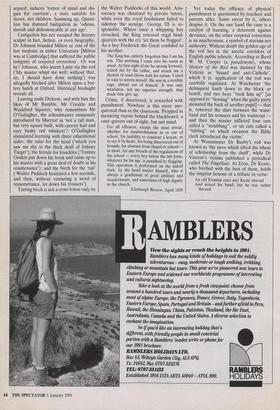THE BOTTOM LINE
Nicholas Barker advocates
sensible spanking in No Smacking Week
Oh ye! who teach the ingenuous youth of nations, Holland, France, England, Germany or Spain, I pray ye flog them upon all occasions - It mends their morals, never mind the pain! Byron
MODERN society is more violent and less physical than, ever before. It seeks con- frontation, yet shuns contact. This week with war on the horizon, the flag of parental pacifism is boldly unfurled with 'National No Smacking Week'. Smacking is discouraged, bottoms out of bounds. The point is not punishment per se, but how to punish. How good is a good hiding? Is six of the best really best? No normal parent derives pleasure from hurting a child, least of all their own flesh and blood, yet physical correction is short and sharp, unlike grounding or withdrawal of pocket- money, gating or detention, home and school alternatives that may antagonise, not reform. But does, corporal punishment harbour hostility? Does violence necessari- ly lead to violence? And how often is spanking latent sado-masochism? Not for the first time, parents have been asked to decide.
Hands on or hands off? The Bible, at least, is unambiguous. In the Old Testa- ment Solomon decreed: He that spareth the rod hateth his son; but he that loves him chastises him betimes.' In other words, bend over, boys, and receive with gratitude a remedial dose of parental affection.
Philosophical opinion is inevitably di- vided. In favour of fustigation are Plato, Aristotle and Superanus. Actually, if a debate on child discipline was staged, Superanus might prove a hindrance not a help. Although he 'never grudged himself' the rod ('in order to learn all that school- masters and tutors teach their pupils'), Superanus was 'seen more than once in the public baths to inflict on himself the severest of corrections'. To sum up the defence, Plato has concluded: 'If a child obeys, so much the better! If not, one sets him straight, as one sets up and guides a sapling, but we must maintain him in the way by threats and blows.'
Opposing the motion, the mainstream supporters of National No Smacking Week are Quintilian, Plutarch and Erasmus. (Homer is on the bench having been mercilessly flogged by Toilus, his school- master, later crucified by command of King Ptolemy). Plutarch is the Achilles' heel of this team. Corporal punishment, he argued, induces 'torpor of mind and dis- gust for exertion', a state suitable for slaves, not children. Summing up, Quinti- lian has damned fustigation as 'odious, slavish and dishonourable at any age'.
Castigation has not escaped the literary scalpel in fact, fiction, or even biography. Dr Johnson branded Milton as 'one of the last students in either University [Milton was at Cambridge] that suffered the public indignity of corporal correction'. Or was he? Johnson, who learnt Latin via the rod (`My master whipt me well; without that, sir, I should have done nothing') was allegedly birched after Milton upon a but- tery hatch at Oxford. Historical hindsight reveals all.
Leaving aside Dickens, and with him the likes of Mr Bumble, Mr Creakle and Wackford Squeers, who remembers Mr O'Gallagher, the schoolmaster ominously introduced by Marryat as 'not a tall man, but very square built, with carroty hair and very bushy red whiskers'? O'Gallagher stimulated learning with three educational aides; the ruler for the head ('which you saw me shy at the thick skull of Johnny Target'); the ferrule for knuckles (`Tommy Goskin put down his book and came up to his master with a great deal of doubt in his countenance'); and the birch for the 'tail' (Walter Puddock hesitated a few seconds, and then, without venturing a word of remonstrance, let down his trousers').
Tasting birch is not a cross borne only by the Walter Puddocks of this world. Aris- tocracy was chastised by private tutors, while even the royal fundament failed to sidestep the scourge. George III is re- sponsible. Where once a whipping boy crouched, the King restored regal hind- quarters with the cry let them be flogged'. As a boy Frederick the Great confided to his mother:
The King has entirely forgotten that I am his son. This morning I came into his room as usual. At first sight of me he sprang forward, seized me by the collar, and struck me a shower of cruel blows with his rattan. I tried in vain to screen myself. He was in a terrible rage, almost out of himself. It was only weariness, not my superior strength, that made him give up.
Crime, if discovered, is rewarded with punishment. Nowhere is this more une- quivocal than in the classroom. Propped in menacing repose behind the blackboard, a cane quivers out of sight, but not mind.
For all offences, except the most trivial, whether for insubordination in or out of school, for inability to construe a lesson, or to say it by heart, for being discovered out of bounds, for absence from chapel or school— in short, for any breach of the regulations of the school — every boy below the 6th form, whatever be his age, is punished by flogging. This operation is performed on the naked back, by the head master himself, who is always a gentleman of great abilities and acquirements, and sometimes of high dignity in the church.
Edinburgh Review, April 1830
Yet today the efficacy of physical punishment is questioned by teachers and parents alike. Some swear by it, others despise it. On the one hand the cane is a catalyst of learning, a deterrent against deviance, on the other corporal correction is an anachronism, a symbol of atavism not authority. Without doubt the golden age of the rod lies in the ascetic corridors of English public schools. According to Revd W. M. Cooper (a pseudonym), whose History of the Rod was damned by the Vatican as 'biased and anti-Catholic', which it is, application of the rod was carefully regulated. At Winchester 'the delinquent knelt down to the block or bench, and two boys "took him up" [as opposed to "horsing" when the guilty party mounted the back of another pupil] — that is, removed the shirt between the waist- band and his trousers and his waistcoat and then the master inflicted four cuts called a "scrubbing", or six cuts called a "bibling" on which occasion the Bible clerk introduced the victim.'
At Westminster Dr Busby's rod was known as 'the sieve which sifted the wheat of scholarship from the chaff, while Dr Vincent's victims published a periodical called The Flagellant. At Eton, Dr Keate, who birched with the best of them, holds the singular honour of a tribute in verse: An old Etonian once met Keate abroad And seized his hand; but he was rather floored To see the Doctor seemed to know him not; `Doctor,' quoth he, 'you've flogged me oft, I wot; And yet it sems that me you've quite forgot.' `E'en now,' says Keate, 'I cannot guess your name - Boys' backsides are so very much the same.'
In days past Etonians were docked half a guinea a term for birch, regardless of innocence, partly because flogging bore no stigma. 'Virgins' sometimes volunteered for initiation, bottoms up for the birch, rather than face ridicule at the hands of their peers. Far from being a disgrace, corporal punishment was a source of enter- tainment. Masters like Brinsley Richards admitted: 'I gradually came to witness the executions in the Lower School not only with indifference, but with amusement.'
There is nothing amusing about not being able to sit down. Wallowing in self-pity, a patient requires instant therapy, or failing that, genuine distraction, but not, under any circumstances, advice. The pre- cept 'take it like a man' is liable to unleash from solitary confinement a man hellbent on revenge. 'Anyway, why like a man? The fairer sex has found few favours among birch-wielding governesses, strict school- mistresses, even parents. Lady Anne Bar- nard moaned about her mother's 'little white hand, which though soft, was no slight species of flagellation'. In the clas- sroom 'enough castigation went on' at Regent House school for girls 'to have satisfied the most strenuous upholders of the oft-quoted proverb, "Spare the rod and spoil the child!" ' Indeed, alternative atonement, such as enforced donning of a charity girl's uniform, in this case the 'Red Girls' of Bristol, was deemed a fate worse than whipping. One old girl told her grand-daughter: 'Anything more unbe- coming or more uncomfortable could scarcely be imagined, and there was hardly one of us that would have preferred a flogging.' Unfortunately, school punish- ment remains preordained. Choice of pe- nance is rarely an option.
Without reason, punishment is obviously truculent. Mr Nicol of Edinburgh High School once issued invitations to Mr Cruickshank, his colleague, to come and listen to his 'organ', whereupon he lined up a dozen boys and inflicted 'a rapid, cursory flagellation up and down the row, produc- ing a variety of notes from the patients'.
Without remorse, punishment is simply tyrannical. Despite Solomon's confident maxim `withold not correction from the child; for if thou beatest him with the rod, he shall not die', punitory murder has taken place in the classroom. In 1699 Robert Carmichael trounced a pupil to his death. Sentenced to seven stripes, the schoolmaster was banished for life from Scotland.
Dr Barker conducts research at Cam- bridge University on self-flagellation, with particular reference to the Philippines.












































 Previous page
Previous page